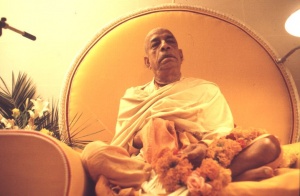CC Madhya 6.194: Difference between revisions
m (1 revision(s)) |
(Vanibot #0054 edit - transform synonyms into clickable links, which search similar occurrences) |
||
| (One intermediate revision by one other user not shown) | |||
| Line 1: | Line 1: | ||
{{ | [[Category:Sri Caitanya-caritamrta - Madhya-lila Chapter 06|C194]] | ||
<div style="float:left">'''[[Sri Caitanya-caritamrta|Śrī Caitanya-caritāmṛta]] - [[CC Madhya|Madhya-līlā]] - [[CC Madhya 6|Chapter 6: The Liberation of Sārvabhauma Bhaṭṭācārya]]'''</div> | |||
<div style="float:right">[[File:Go-previous.png|link=CC Madhya 6.193|Madhya-līlā 6.193]] '''[[CC Madhya 6.193|Madhya-līlā 6.193]] - [[CC Madhya 6.195|Madhya-līlā 6.195]]''' [[File:Go-next.png|link=CC Madhya 6.195|Madhya-līlā 6.195]]</div> | |||
{{CompareVersions|CC|Madhya 6.194|CC 1975|CC 1996}} | |||
{{RandomImage}} | |||
==== TEXT 194 ==== | ==== TEXT 194 ==== | ||
<div | <div class="verse"> | ||
ātmārāmāś ca-śloke ‘ekādaśa’ pada haya | :ātmārāmāś ca-śloke ‘ekādaśa’ pada haya | ||
pṛthak pṛthak kaila padera artha niścaya | :pṛthak pṛthak kaila padera artha niścaya | ||
</div> | </div> | ||
| Line 12: | Line 16: | ||
==== SYNONYMS ==== | ==== SYNONYMS ==== | ||
<div | <div class="synonyms"> | ||
ātmārāmāś | ''[//vanipedia.org/wiki/Special:VaniSearch?s=ātmārāmāś&tab=syno_o&ds=1 ātmārāmāś] [//vanipedia.org/wiki/Special:VaniSearch?s=ca&tab=syno_o&ds=1 ca]'' — known as such; ''[//vanipedia.org/wiki/Special:VaniSearch?s=śloke&tab=syno_o&ds=1 śloke]'' — in the verse; ''[//vanipedia.org/wiki/Special:VaniSearch?s=ekādaśa&tab=syno_o&ds=1 ekādaśa]'' — eleven; ''[//vanipedia.org/wiki/Special:VaniSearch?s=pada&tab=syno_o&ds=1 pada]'' — words; ''[//vanipedia.org/wiki/Special:VaniSearch?s=haya&tab=syno_o&ds=1 haya]'' — there are; ''[//vanipedia.org/wiki/Special:VaniSearch?s=pṛthak&tab=syno_o&ds=1 pṛthak] [//vanipedia.org/wiki/Special:VaniSearch?s=pṛthak&tab=syno_o&ds=1 pṛthak]'' — separately one after another; ''[//vanipedia.org/wiki/Special:VaniSearch?s=kaila&tab=syno_o&ds=1 kaila]'' — made; ''[//vanipedia.org/wiki/Special:VaniSearch?s=padera&tab=syno_o&ds=1 padera]'' — of the words; ''[//vanipedia.org/wiki/Special:VaniSearch?s=artha&tab=syno_o&ds=1 artha]'' — the meaning; ''[//vanipedia.org/wiki/Special:VaniSearch?s=niścaya&tab=syno_o&ds=1 niścaya]'' — certainty. | ||
</div> | </div>' | ||
==== TRANSLATION ==== | ==== TRANSLATION ==== | ||
<div | <div class="translation"> | ||
There are eleven words in the ātmārāma verse, and Śrī Caitanya Mahāprabhu explained each word, one after the other. | There are eleven words in the ātmārāma verse, and Śrī Caitanya Mahāprabhu explained each word, one after the other. | ||
</div> | </div> | ||
| Line 26: | Line 30: | ||
==== PURPORT ==== | ==== PURPORT ==== | ||
<div | <div class="purport"> | ||
The words in the ātmārāma verse are ātmārāmāḥ, ca, munayaḥ, nirgranthāḥ, api, urukrame, kurvanti, ahaitukīm, bhaktim, ittham-bhūta-guṇaḥ and | The words in the ''ātmārāma'' verse are ''ātmārāmāḥ'', ''ca'', ''munayaḥ'', ''nirgranthāḥ'', ''api'', ''urukrame'', ''kurvanti'', ''ahaitukīm'', ''bhaktim'', ''ittham-bhūta-guṇaḥ'' and ''hari''ḥ. | ||
</div> | </div> | ||
__NOTOC__ | |||
<div style="float:right; clear:both;">[[File:Go-previous.png|link=CC Madhya 6.193|Madhya-līlā 6.193]] '''[[CC Madhya 6.193|Madhya-līlā 6.193]] - [[CC Madhya 6.195|Madhya-līlā 6.195]]''' [[File:Go-next.png|link=CC Madhya 6.195|Madhya-līlā 6.195]]</div> | |||
__NOTOC__ | |||
__NOEDITSECTION__ | |||
Latest revision as of 23:41, 19 February 2024

His Divine Grace
A.C. Bhaktivedanta Swami Prabhupada
A.C. Bhaktivedanta Swami Prabhupada
TEXT 194
- ātmārāmāś ca-śloke ‘ekādaśa’ pada haya
- pṛthak pṛthak kaila padera artha niścaya
SYNONYMS
ātmārāmāś ca — known as such; śloke — in the verse; ekādaśa — eleven; pada — words; haya — there are; pṛthak pṛthak — separately one after another; kaila — made; padera — of the words; artha — the meaning; niścaya — certainty.
'
TRANSLATION
There are eleven words in the ātmārāma verse, and Śrī Caitanya Mahāprabhu explained each word, one after the other.
PURPORT
The words in the ātmārāma verse are ātmārāmāḥ, ca, munayaḥ, nirgranthāḥ, api, urukrame, kurvanti, ahaitukīm, bhaktim, ittham-bhūta-guṇaḥ and hariḥ.